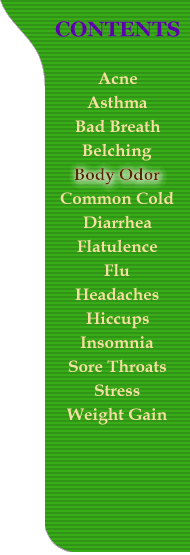|
Body odor begins with
sweat. The odor has two types of sweat glands and both types produce sweat
that is made up largely of water. The eccrine glands, which are located
on almost every part of the body, produce the sweat that cools the body.
The apocrine glands, which are located in the armpits, around the nipples
and in the groin, produce sweat whose function, at least in modern times,
is not clear. Nonetheless, one thing is obvious, the sweat from the apoccrine
glands can make you stink, because it contains a substantial amount of
oil, which provides food for bacteria. It;s this bacterial feeding frenzy
that causes the offensive odor. Here's what the experts recommend you do
to come up smelling like roses:
Keep it clean. The best way to preventbody odor is to wash away the sweat that forms on the skin in the area of the apocrine glands and reduce the number of bacteria waiting there to feed upon it. So, clean the underarm and groin area with soap, preferably a deodorant soap and water at least once a day. Bathe your britches. Sweat that seeps into your clothing may remind you of its presence at very inopportume times. What's more, dried, bacteria-containing sweat can damage the fibers of your clothing. You should wash you washable clothing each time you wear it.
Get tough with an antiperspirant. Since body odor begins with
sweat, one of the best ways to control it is toreduce the amount of sweat.
You can probably reduce perspiration by as much as 50 percent with antiperspirant.
Beat irritation and odor. If you've tried antiperspirants and deodorants and found that they irritate your skin, you might instead try antibacterial soap such as chlorhexidine (Hibiclens) or an over-the-counter antibiotic ointment. Other options for sensitive skins include using talcum powder or baking soda in place of an antiperspirant or deodorant. Quiet your diet. Certain foodss such as hot peppers, can affect the amount of sweat an individual produces. And the aroma of other pungent foods, such as garlic, can be carried in your sweat. If your aim is to prevent body odor, cut out foods like onions, garlic, hot spices and beer. |
 |